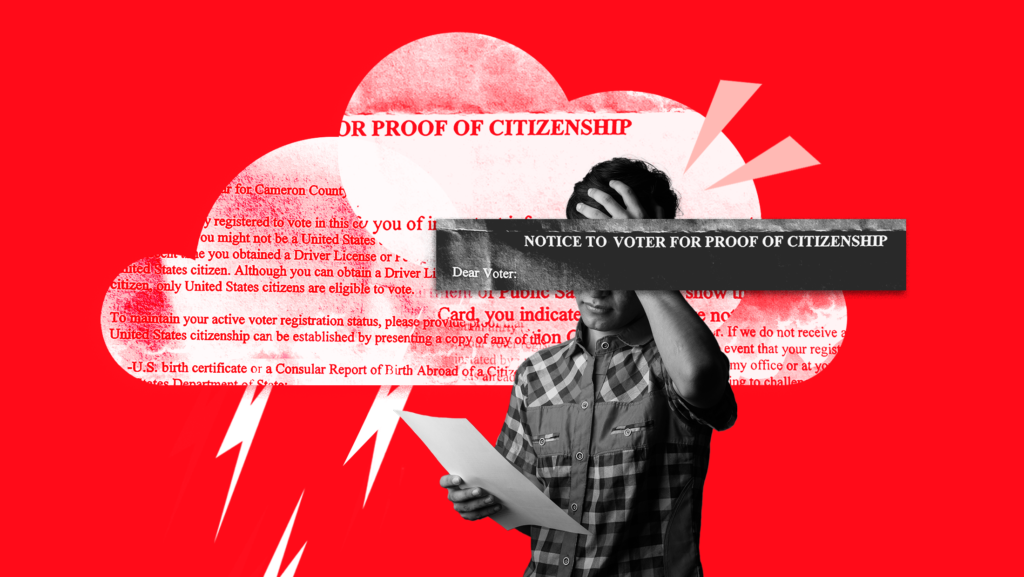Something is Rotten in the State of Texas

In January, Cameron County in Texas agreed to halt a voter removal program after the grassroots political organization Voto Latino pointed out that the practice violates the National Voter Registration Act (NVRA), which prohibits canceling voter registrations within 90 days of a federal election. In late December, Cameron County had begun sending letters to voters it suspected might not be citizens, giving them 30 days to prove their citizenship or their registrations would be purged. But why was Cameron County removing voters in the first place? Here, we break down what exactly is going on in Texas right now and why you should care.
What is a voter purge, anyway?
States typically maintain lists of all registered voters — this is how election officials know you’re eligible to vote when you show up at a polling place or request a mail-in ballot. These lists need to be updated periodically to add new voters and remove ineligible ones. Too often, however, this process is done irresponsibly and can purge still-eligible voters instead — often with little warning or opportunity to fix the error. This is especially true when officials use bad data or mix up the identities of two separate individuals. Some voters won’t know they’ve been removed until they show up at a polling place to vote.
While states can use a variety of pretexts to purge voter rolls, one that’s becoming increasingly common is to remove noncitizens that may have registered to vote — even though there’s no evidence that noncitizens vote in U.S. elections in any significant number. This is what Texas is doing and why Cameron County sent out letters last year.
Texas keeps flagging actual citizens for removal in its purge.
Texas has tried to purge noncitizens for years, but it keeps flagging actual citizens for removal. When the state first attempted in 2019, acting Texas Secretary of State David Whitley (R) announced it had found 95,000 noncitizens on the voter rolls and gave the names to the Texas attorney general for possible prosecution for illegally voting. But the state soon discovered that, due to errors in state data and methodology, tens of thousands of the voters flagged were in fact naturalized citizens. Three legal challenges to the purge argued it was clearly flawed and unconstitutionally violated the rights of voters of color. As a result of a settlement in these cases, Whitley halted the effort. He later resigned.
While the legal settlement stopped the original purge, it didn’t stop the state from conducting a new one with improved data or methodology. Last fall, Texas tried again with a scaled-down approach, flagging possible noncitizen registrations for review and sending them to each county to investigate. But once again, it looks like Texas is flagging the registrations of actual citizens for removal. Elections offices in some of the state’s largest counties have found many of the voters flagged are indeed naturalized U.S. citizens — or in a few cases even natural-born ones.
Now, if Texas was simply flagging possible noncitizens and stopping at that, that would be one thing. But instead, the way Texas’ program works is that the flagged voters have to prove their citizenship within 30 days to avoid being purged, but Texas doesn’t have to prove they are noncitizens to go through with the removal. As of December, 2,327 voters have been removed — but only 278 were actually confirmed to be noncitizens. The rest simply didn’t respond to the notice in time and could still be citizens. In this way, Texas is very likely needlessly disenfranchising Americans.
In light of these problems, the ACLU of Texas and several other civil rights groups filed a lawsuit last week against the Texas secretary of state to gain access to records about the purge to see if Texas is sweeping too broadly and endangering the rights of citizens. Texas is required to provide this information under the NVRA, but it has yet to do so. Meanwhile, the purge in Cameron County and the rest of the state is on hold until the state’s primary elections have passed, but once the elections are over they will likely resume, absent any new developments.
No voter purges are good, but ones targeting noncitizens like Texas’ are particularly egregious for their tendency to target naturalized citizens — predominantly voters of color. Even though naturalized citizens weren’t born in the United States, they have just as much a right to vote as anyone born here. Whenever a state tries to remove noncitizens from their voter rolls, it’s essential we make sure they aren’t improperly removing citizens as well.